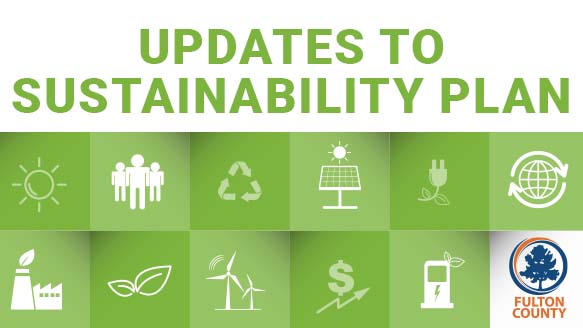Fulton County Board of Commissioners Approves Major Updates to its Sustainability Plan

Fulton County Board of Commissioners Approves Major Updates to its Sustainability Plan
March 01, 2022
Updates to the county’s plan will work to accelerate sustainability efforts by 2030.
The Fulton County Board of Commissioners took major steps toward its continued commitment to implementing viable sustainability efforts at the county level. During its February 16 meeting, the Board approved 2030 goals updates to the previously adopted 2019 Sustainability Plan, which serves as a roadmap to meet Fulton County’s efforts to develop a healthy and sustainable environment.
“This Board understands that the issues of sustainability are more than something that needs to be talked about,” said Fulton County Board of Commission Chairman Robb Pitts. “It’s a commitment by this group that will guarantee we will continue to work to identify every opportunity and solution that focuses on educating our residents and employees on the benefits of environmental sustainability.”
The goal of the initial Sustainability Plan was to develop and streamline objectives to allow the county to leverage in-house policies to enhance sustainability, resource efficiency, economic development, and technology strategies by 2025. First adopted in 2019, the plan outlined six key areas designed to drive sustainability and resilience, including climate change, social equity and transit, high performance county infrastructure, fostering partnerships, budget appropriation, and education and outreach.
To strengthen those priorities, several updates will be implemented, the highlights of which include:
1. Reduce buildings energy usage by 50% by 2030 through the assessment of facilities and implementation of cost-effective energy conservation measures.
2. Offset 25% of electricity demand and carbon dioxide emissions by 2030 through the implementation of a solar energy program.
3. Transition 25% or all light-duty administrative vehicles to electric vehicles and plug-in hybrid electric vehicles by 2030.
4. Increase the percentage of employees who are commuting to work via sustainable and alternative modes.
5. Establish a green workforce development training and job placement program.
Internal and external committees will also be developed to maintain accountability and assist in reviewing sustainability programs within the county.
“This Board understands that the issues of sustainability are more than something that needs to be talked about,” said Fulton County Board of Commission Chairman Robb Pitts. “It’s a commitment by this group that will guarantee we will continue to work to identify every opportunity and solution that focuses on educating our residents and employees on the benefits of environmental sustainability.”
The goal of the initial Sustainability Plan was to develop and streamline objectives to allow the county to leverage in-house policies to enhance sustainability, resource efficiency, economic development, and technology strategies by 2025. First adopted in 2019, the plan outlined six key areas designed to drive sustainability and resilience, including climate change, social equity and transit, high performance county infrastructure, fostering partnerships, budget appropriation, and education and outreach.
To strengthen those priorities, several updates will be implemented, the highlights of which include:
1. Reduce buildings energy usage by 50% by 2030 through the assessment of facilities and implementation of cost-effective energy conservation measures.
2. Offset 25% of electricity demand and carbon dioxide emissions by 2030 through the implementation of a solar energy program.
3. Transition 25% or all light-duty administrative vehicles to electric vehicles and plug-in hybrid electric vehicles by 2030.
4. Increase the percentage of employees who are commuting to work via sustainable and alternative modes.
5. Establish a green workforce development training and job placement program.
Internal and external committees will also be developed to maintain accountability and assist in reviewing sustainability programs within the county.

